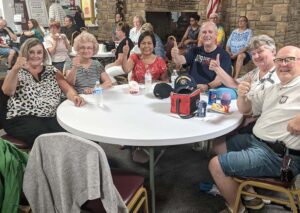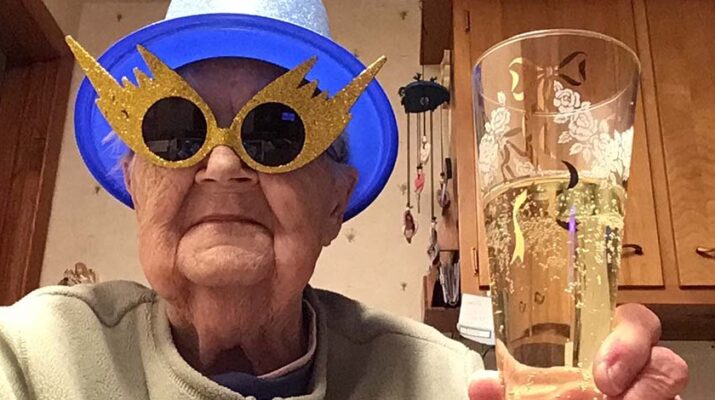By Deborah Jeanne Sergeant
Retirement is time to sit back, put up your feet and relax. Or is it?
Watching TV all day or napping on a whim may seem like an ideal retirement. However, it can quickly slide into a loss of connection and even feelings of meaninglessness. These factors can harm health. That is one reason that Mary Sikorski, 91, a widow, likes keeping busy. Born in Buffalo, she drove a school bus for 35 years and retired in 1995.
“Staying active keeps me young and healthy,” she said. “My attitude toward life is always ‘stay open to new ideas and things.’”

One example is using her iPad and staying in contact with her daughter, son and five grandchildren. Sikorski also has five great-grandchildren. As a young person, she never dreamed of such convenient means of communication.
She also likes to participate in activities and meet friends at the Cheektowaga Senior Center.
“I’m not feeling sorry for myself now that I am a widow,” she said. “Coming to the Senior Center does that.”
She enjoys jigsaw puzzles and is working on “the challenges of 1,000 pieces in a box” with puzzles in progress both at the center and at home.
“When I finish, I’m feeling great and looking at the beautiful pictures,” she said.
Every day, she completes the newspaper crossword puzzle and works on Wordle puzzles, activities which she feels help keep her mind sharp. Her diminished hearing makes speaking on the phone challenging, so visiting with others at the center helps keep her connected.
Sikorski encourages other retirees to join a senior center.
“You meet so many new friends and that is so important,” she said.
“They have so much to offer. Plus, you yourself have so much to offer to others.”
She likes completing craft projects such as with ceramics.
“When you retire, it is a special time to reinvent yourself,” she said.
“You find you have time for yourself.”
She likes reading, walking in nature and meeting friends for breakfast.
“Life is great; live it to the full extent,” she said. “You only have one chance. We can’t come a second time and change things. If you are fortunate to have grandkids, be with them. They keep you young. You are never too old to act like a kid.”
Sikorski’s advice rings true with Kerry Peek, director of senior services at Cheektowaga Senior Center.
“It’s about the socialization and connection that older adults find,” Peek said. “They now have ways to use their talents, explore new opportunities for hobbies, education, awareness and enrichment.”
She said that some older participants at the center have lost many of their friends and that making new ones at the center has provided a second chance at friendship. As these relationships form, participants have more places to go and things to do.
“In many cases, they’re making new connections with people they wouldn’t have met otherwise,” Peek said.
In addition to socialization and connecting with other adults, Peek said that the center provides older adults with connections to services and resources about which they may not be aware.
Staying physically active is important to avoid becoming sedentary.
Even retirees who had desk jobs will have much less movement after retirement since they no longer need to get up and go somewhere else for the day. Regular exercise can reduce the risk of disabling falls, weight gain and physical decline.
This may not mean spending hours at a gym but could include a fun activity, like dance class, tai chi group, geocaching, or tennis. Many people find that attending a class builds in accountability because other group members expect their attendance. Classes can also help foster new friendships to replace some of the social interaction lost upon retirement.
“I like to counsel patients who are nearing retirement to have a good plan in place,” said Daniel King, a geriatrician with Highland Hospital. “Most people have worked their whole life perhaps in one job. There’s going to be a large hole and a lot of free time when they retire.”
Making specific goals to learn a new skill, travel to certain venues and volunteer or teach certain skills or populations can offer concrete ways to remain active. Otherwise, King warns patients that they can become complacent and lose function over time.
He also encourages patients to keep a schedule to maintain structure in their day, such as rising, dining and going to bed at the same time most days. Planning times to volunteer, exercise and cook healthful meals is also important. Of course, the flexibility in retirement is part of the fun. Having no plan can cause problems since people crave routine.
“Retirement is a challenging time for a lot of people and they underestimate how challenging it will be,” King said. “It takes careful planning and thought. You plan your savings. You have to plan for your time in a way that’s rewarding for you.”
Featured image: Mary Sikorski, 91, a widow, likes keeping busy. Born in Buffalo, she drove a school bus for 35 years and retired in 1995. “Staying active keeps me young and healthy,” she says.

